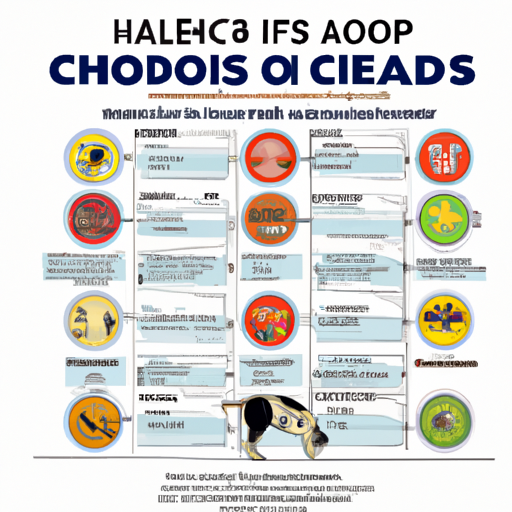As a caregiver to your beloved canine companion, it’s crucial to understand the dietary restrictions that come with them. Dogs, like us humans, have their share of dietary dos and don’ts. While it’s tempting to share a chunk of chocolate or a piece of fruit with them, it’s important to remember that what’s healthy for us may not be healthy for them.
1. Introduction to Common Toxic Foods for Dogs
Dogs have a different metabolism compared to humans, meaning some foods that are perfectly safe for us can be extremely dangerous for them. Here are some of the most common toxic foods for dogs:
- Chocolate
- Grapes and raisins
- Onions and garlic
- Alcoholic beverages
- Caffeine
- Avocados
- Macadamia nuts
- Xylitol (a sweetener often found in gum and candies)
2. The Effects of Chocolate on Dogs
Chocolate, particularly dark or baking chocolate, can be seriously harmful to dogs. It contains theobromine, a substance that dogs can’t metabolize effectively. This can cause vomiting, diarrhea, irregular heart rhythm, seizures, and in severe cases, death.
3. Why Grapes and Raisins Are Harmful
The exact reason why grapes and raisins are toxic to dogs is still not known. However, even small amounts can lead to severe kidney damage and can be fatal. Symptoms of poisoning include vomiting, diarrhea, and lethargy.
4. Onions and Garlic: The Hidden Dangers
Onions and garlic, whether raw or cooked, can be harmful to dogs. They contain thiosulfate, which can cause anemia by damaging red blood cells. Signs of poisoning include weakness, lethargy, and discolored urine.
5. Alcoholic Beverages and Caffeine: A Dangerous Stimulant
Alcohol and caffeine can cause a wide range of symptoms in dogs, from vomiting and diarrhea to tremors, elevated heart rate, seizures, and even death. Even small amounts can be dangerous, so it’s best to keep these beverages out of your dog’s reach.
6. The Unexpected Toxicity of Avocados
Avocado contains persin, a fungicidal toxin which can cause vomiting and diarrhea in dogs. Moreover, the pit can pose a choking hazard or cause a blockage in the digestive tract.
7. Macadamia Nuts: Small in Size, Big in Danger
Macadamia nuts can cause weakness, depression, vomiting, tremors, and hyperthermia in dogs. Symptoms usually appear within 12 hours of ingestion and can last 12 to 48 hours.
8. Xylitol: The Hidden Threat in Sugar-Free Foods
Xylitol, a sugar substitute found in many sugar-free products, can cause a rapid insulin release in dogs, leading to hypoglycemia (low blood sugar). Symptoms include vomiting, loss of coordination, seizures, and in severe cases, liver failure.
| Food | Symptoms | Timeframe |
|---|---|---|
| Chocolate | Vomiting, Diarrhea, Irregular Heart Rhythm, Seizures | Immediate |
| Grapes/Raisins | Vomiting, Diarrhea, Lethargy | 24 Hours |
| Onions/Garlic | Weakness, Lethargy, Discolored Urine | 24 Hours |
| Alcohol/Caffeine | Vomiting, Diarrhea, Tremors, Elevated Heart Rate | Immediate |
| Avocado | Vomiting, Diarrhea | Immediate |
| Macadamia Nuts | Weakness, Depression, Vomiting, Tremors | 12 Hours |
| Xylitol | Vomiting, Loss of Coordination, Seizures | Immediate |
FAQ
1. What should I do if my dog has eaten something toxic?
Immediately contact your vet or a pet poison control center. Don’t induce vomiting unless instructed to do so.
2. Can my dog have a small amount of these foods?
No, even small amounts of these foods can be harmful to your dog. Always err on the side of caution.
3. Are there any human foods that are safe for my dog?
Yes, there are many human foods that are safe for dogs, such as carrots, apples (without seeds), and plain rice. Always introduce new foods gradually and in moderation.
The food your dog eats can directly affect their health and well-being. By being aware of the foods that are toxic to dogs, you can ensure that your furry friend stays healthy and happy.



